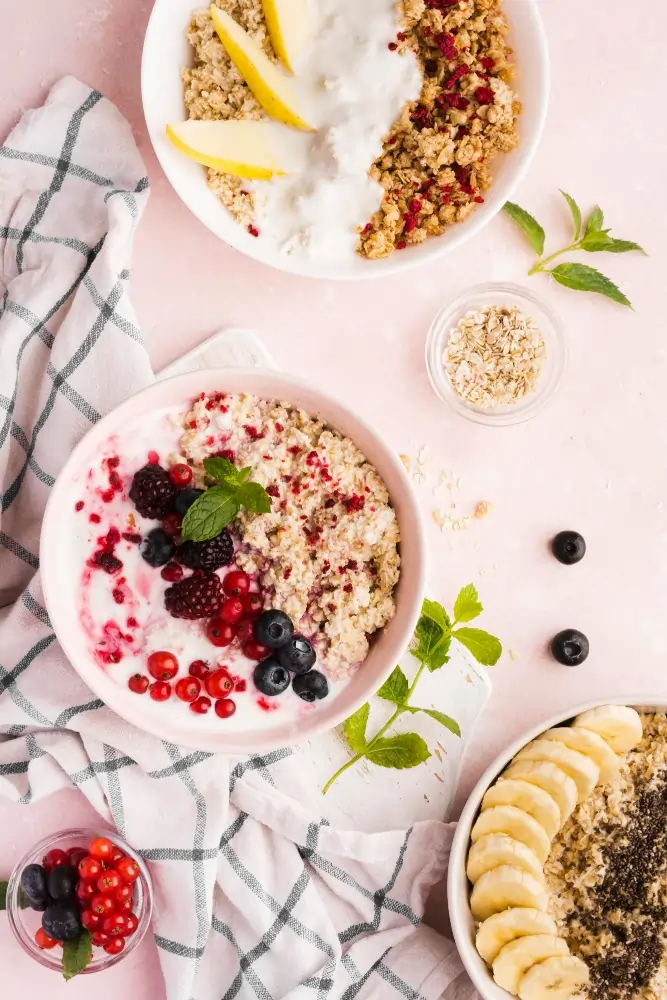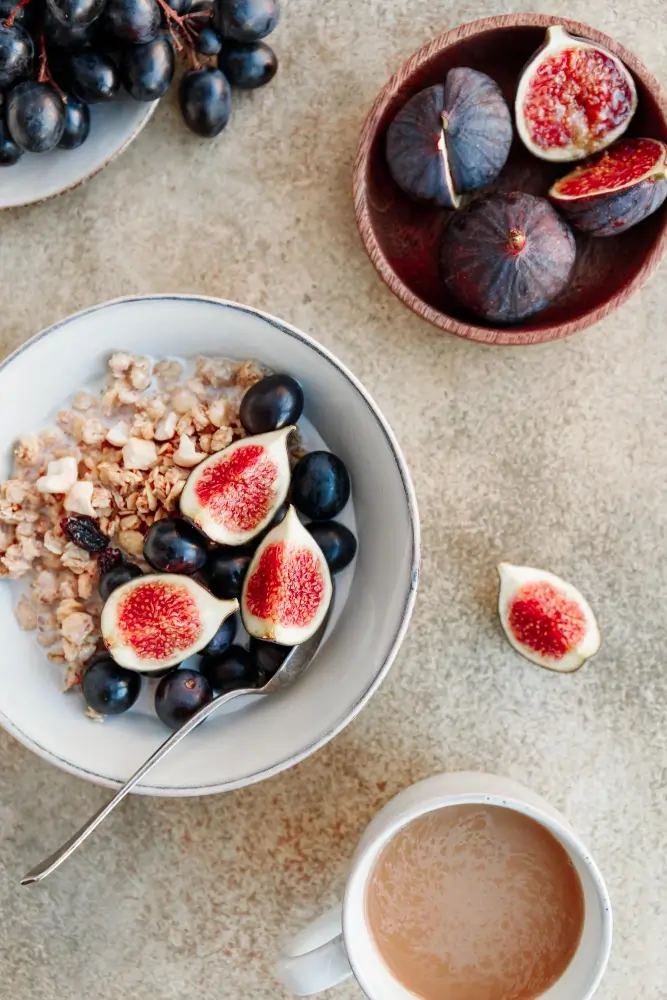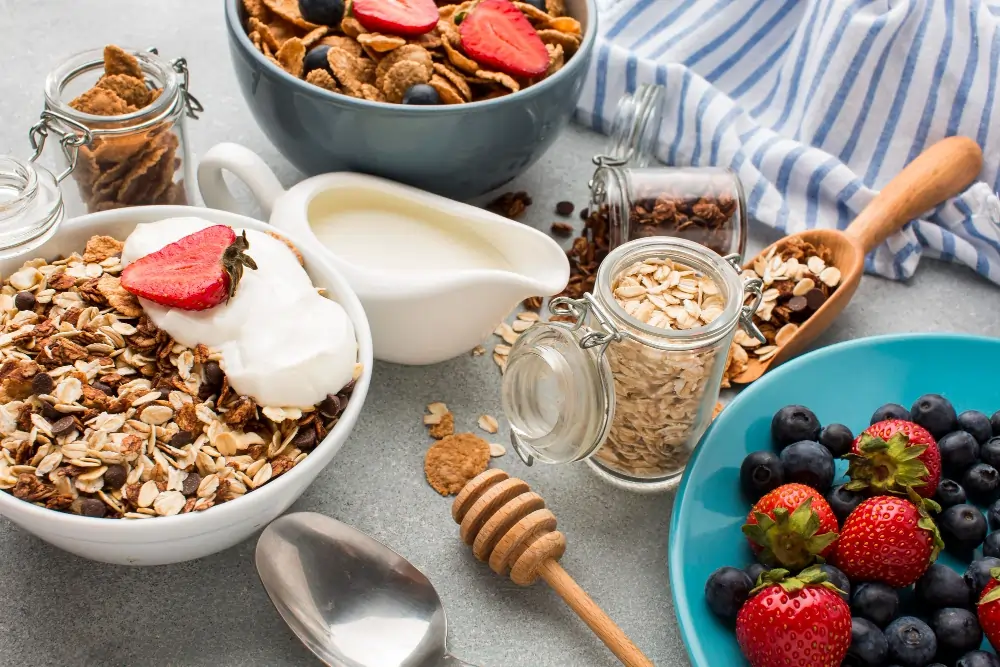Introduction
Inflammation, while a natural part of the body’s immune response, can lead to chronic health issues if left unchecked. Starting your day with anti-inflammatory breakfast recipes is a powerful way to combat inflammation and promote overall well-being. This article explores what an anti-inflammatory diet entails, why breakfast is a crucial meal, key ingredients to include, and 15 delicious recipes to incorporate into your routine.
What Is an Anti-Inflammatory Diet?
An anti-inflammatory diet focuses on foods that reduce inflammation in the body while minimizing those that trigger it. Chronic inflammation is linked to conditions like heart disease, arthritis, and diabetes. Foods rich in antioxidants, omega-3 fatty acids, and phytonutrients form the cornerstone of this diet.
- Foods to Include: Leafy greens, berries, nuts, seeds, fatty fish, and whole grains.
- Foods to Avoid: Processed foods, refined sugars, and trans fats.
This dietary approach is not just a meal plan but a lifestyle, aimed at reducing inflammation and promoting long-term health.
Why Breakfast Matters
Breakfast is often called the most important meal of the day for a reason. It sets the tone for energy levels, focus, and even your inflammatory response. Consuming an anti-inflammatory breakfast jumpstarts your metabolism and provides your body with essential nutrients to combat oxidative stress.
- Skipping breakfast can lead to blood sugar fluctuations, triggering inflammation.
- A balanced breakfast rich in fiber, healthy fats, and proteins stabilizes blood sugar and reduces inflammatory markers.
Making mindful breakfast choices is a small but impactful step toward achieving better health.
Key Ingredients for Anti-Inflammatory Breakfasts
Incorporating the right ingredients is essential to create anti-inflammatory breakfast recipes that are both delicious and effective.
1. Fruits and Vegetables
- Berries (blueberries, strawberries, raspberries): Packed with antioxidants.
- Spinach and kale: Rich in vitamins and minerals.
2. Healthy Fats
- Avocados: High in monounsaturated fats.
- Nuts and seeds: Sources of omega-3 fatty acids.
3. Whole Grains
- Oats: Provide soluble fiber to reduce cholesterol and inflammation.
- Quinoa: A protein-rich grain that’s gluten-free.
4. Spices
- Turmeric: Contains curcumin, a potent anti-inflammatory compound.
- Ginger: Supports digestion and reduces inflammation.
5. Plant-Based Proteins
- Chia seeds: High in omega-3s and fiber.
- Almond butter: A creamy, protein-packed addition to meals.
These ingredients not only reduce inflammation but also offer a variety of flavors and textures to enhance your breakfast options.

15 Anti-Inflammatory Breakfast Recipes
1. Turmeric Oatmeal Bowl
Combine oats with almond milk, a pinch of turmeric, and a drizzle of honey. Top with blueberries and chopped walnuts for a nutrient-packed start.
2. Berry Chia Seed Pudding
Mix chia seeds with coconut milk and let it sit overnight. Add a topping of mixed berries and a sprinkle of flaxseeds.
3. Spinach and Avocado Smoothie
Blend spinach, avocado, banana, and unsweetened almond milk. Add a teaspoon of flaxseed oil for an extra anti-inflammatory boost.
4. Quinoa Breakfast Bowl
Prepare quinoa and mix it with almond milk, cinnamon, and a touch of maple syrup. Top with pecans and fresh figs.
5. Sweet Potato Toast
Slice sweet potatoes into thin pieces and toast them. Add almond butter and a sprinkle of chia seeds.
6. Ginger Turmeric Latte
Blend turmeric, ginger, cinnamon, and unsweetened coconut milk for a warming anti-inflammatory drink.
7. Vegan Breakfast Wrap
Fill a whole-grain tortilla with hummus, spinach, avocado slices, and roasted red peppers.
8. Oat and Almond Energy Bars
Combine oats, almond butter, honey, and chopped dried fruits. Bake until firm and cut into bars for an on-the-go option.
9. Green Breakfast Bowl
Mix cooked quinoa with steamed kale, avocado, and a poached egg. Sprinkle with pumpkin seeds.
10. Baked Pears with Walnuts
Halve a pear, bake until tender, and top with walnuts and a drizzle of honey.
11. Blueberry and Almond Pancakes
Prepare pancakes with almond flour and top with fresh blueberries and a dollop of Greek yogurt.
12. Golden Milk Overnight Oats
Soak oats in coconut milk, turmeric, and a pinch of black pepper. Top with fresh pineapple chunks.
13. Savory Chickpea Flour Pancakes
Make pancakes with chickpea flour, water, and spices. Serve with a side of sautéed spinach and mushrooms.
14. Coconut Yogurt Parfait
Layer coconut yogurt, granola, and mixed berries for a quick and nutritious breakfast.
15. Avocado and Egg Toast
Spread mashed avocado on whole-grain toast and top with a soft-boiled egg and a sprinkle of turmeric.
Lifestyle Tips to Complement Your Diet
While incorporating anti-inflammatory breakfast recipes is essential, other lifestyle habits can amplify their benefits:
- Stay Hydrated: Drinking water reduces inflammation by flushing out toxins.
- Regular Exercise: Engaging in moderate physical activity helps lower inflammatory markers.
- Adequate Sleep: Poor sleep increases stress hormones, which can trigger inflammation.
- Stress Management: Practices like yoga, meditation, and mindfulness combat stress-induced inflammation.
By aligning your dietary choices with these lifestyle tips, you can create a holistic approach to reducing inflammation.

FAQs
What breakfast foods are anti-inflammatory?
Anti-inflammatory breakfast foods include oatmeal, chia seed pudding, smoothies made with leafy greens and berries, and avocado toast on whole-grain bread. Ingredients such as turmeric, ginger, and nuts also provide anti-inflammatory benefits.
What are the top 3 anti-inflammatory foods?
- Berries: Blueberries, strawberries, and raspberries are rich in antioxidants that fight inflammation.
- Fatty Fish: Salmon, mackerel, and sardines contain omega-3 fatty acids, which reduce inflammation.
- Leafy Greens: Kale, spinach, and Swiss chard are packed with vitamins and minerals that support an anti-inflammatory diet.
Are eggs anti-inflammatory?
Eggs can be part of an anti-inflammatory diet when consumed in moderation. They are rich in protein and essential nutrients. However, those with sensitivities or allergies to eggs may experience an inflammatory response.
How can I reduce inflammation in the morning?
Start your morning with an anti-inflammatory breakfast that includes whole foods, such as oats, fruits, and healthy fats. Adding spices like turmeric and ginger to your meals or drinks can further help. Staying hydrated and engaging in light stretching or yoga can also reduce morning inflammation.
Is banana anti-inflammatory?
Yes, bananas can have mild anti-inflammatory properties. They are rich in nutrients like vitamin C , vitamin B6 , and fiber , which can help reduce inflammation in the body. Bananas also contain antioxidants and resistant starch (especially in less ripe bananas), which may promote gut health and reduce inflammatory markers. However, while bananas can contribute to an anti-inflammatory diet, they are not a cure-all for chronic inflammation. A balanced diet that includes a variety of fruits, vegetables, whole grains, and healthy fats is more effective for managing inflammation.
Is oatmeal better than eggs for breakfast?
The answer depends on your individual nutritional needs and health goals. Both oatmeal and eggs have their own unique benefits:
Oatmeal:
- High in fiber : Oatmeal is rich in soluble fiber, particularly beta-glucan , which can help lower cholesterol levels, improve digestion, and keep you feeling full longer.
- Low in calories : Oatmeal is generally lower in calories compared to eggs, making it a good option if you’re looking to manage your weight.
- Complex carbohydrates : Provides a steady release of energy, making it a good choice for sustained energy throughout the morning.
- Heart-healthy : The fiber in oatmeal can support heart health by reducing LDL (“bad”) cholesterol levels.
Eggs:
- High-quality protein : Eggs are considered a complete protein, containing all nine essential amino acids, which can help with muscle repair and satiety.
- Rich in nutrients : Eggs are packed with essential nutrients like vitamin D , B vitamins , selenium , and choline , which are important for brain health, immune function, and metabolism.
- Healthy fats : Eggs contain healthy fats, including omega-3 fatty acids (especially in pasture-raised or omega-3 enriched eggs), which can support heart health and reduce inflammation.
- Versatility : Eggs can be prepared in many ways and paired with other nutritious foods like vegetables, making them a flexible option.
Which is better?
- For weight loss or blood sugar control : Oatmeal might be better due to its high fiber content, which helps stabilize blood sugar and keep you full longer.
- For muscle building or higher protein needs : Eggs might be a better choice because of their high-quality protein content.
- For overall nutrition : Both foods are nutritious, but eggs provide more essential nutrients like vitamin D and choline, while oatmeal offers more fiber and complex carbs.
Ultimately, the “better” choice depends on your personal health goals, dietary preferences, and nutritional needs. Some people even combine the two (e.g., having eggs with a side of oatmeal) to get the benefits of both!
What is the healthiest breakfast to eat?
The healthiest breakfast can vary depending on individual dietary needs, health goals, and preferences. However, a balanced breakfast that includes a mix of protein , healthy fats , fiber , and complex carbohydrates is generally considered the most nutritious option. This combination helps stabilize blood sugar levels, keeps you full longer, and provides sustained energy throughout the morning.
Here are some examples of healthy breakfast options:
1. Greek Yogurt with Berries and Nuts
- Why it’s healthy : Greek yogurt is high in protein, which helps with satiety and muscle repair. Berries (like blueberries, strawberries, or raspberries) are rich in antioxidants, fiber, and vitamins. Adding nuts like almonds, walnuts, or chia seeds provides healthy fats and additional protein.
- Benefits : Supports gut health, reduces inflammation, and keeps you full longer.
- Optional : Add a drizzle of honey or a sprinkle of cinnamon for extra flavor.
2. Oatmeal with Nut Butter and Fruit
- Why it’s healthy : Oatmeal is a great source of soluble fiber, particularly beta-glucan , which helps lower cholesterol and stabilize blood sugar. Adding nut butter (like almond or peanut butter) provides healthy fats and protein, while sliced bananas, berries, or apples add natural sweetness and extra nutrients.
- Benefits : Keeps you full, supports heart health, and provides sustained energy.
- Optional : Sprinkle with flaxseeds or chia seeds for an omega-3 boost.
3. Avocado Toast with Eggs
- Why it’s healthy : Whole-grain toast provides complex carbohydrates and fiber, while avocado offers healthy monounsaturated fats that support heart health. Eggs are a complete protein source and provide essential nutrients like vitamin D, choline, and selenium.
- Benefits : Provides a balance of healthy fats, protein, and fiber, making it a filling and nutrient-dense meal.
- Optional : Top with sliced tomatoes, spinach, or smoked salmon for added nutrients.
4. Smoothie with Greens, Protein, and Healthy Fats
- Why it’s healthy : A smoothie made with leafy greens (like spinach or kale), a protein source (like protein powder, Greek yogurt, or silken tofu), healthy fats (like avocado or nut butter), and fruits (like banana or berries) is a nutrient-packed way to start the day.
- Benefits : Easy to digest, hydrating, and packed with vitamins, minerals, and antioxidants.
- Optional : Add flaxseeds, chia seeds, or hemp seeds for extra fiber and omega-3s.
5. Chia Seed Pudding
- Why it’s healthy : Chia seeds are rich in fiber, omega-3 fatty acids, and plant-based protein. When soaked in milk (dairy or plant-based), they form a pudding-like texture. You can top it with fresh fruit, nuts, or seeds for added flavor and nutrition.
- Benefits : High in fiber and healthy fats, which help keep you full and support heart health.
- Optional : Add a dollop of nut butter or a sprinkle of granola for extra crunch.
6. Egg and Vegetable Scramble with Whole-Grain Toast
- Why it’s healthy : Eggs provide high-quality protein and essential nutrients, while adding vegetables (like spinach, bell peppers, mushrooms, or tomatoes) boosts the fiber, vitamin, and antioxidant content. Whole-grain toast adds complex carbs and fiber.
- Benefits : A balanced meal that supports muscle repair, brain function, and overall energy levels.
- Optional : Add a slice of avocado or a sprinkle of cheese for extra flavor and healthy fats.
7. Overnight Oats
- Why it’s healthy : Overnight oats are made by soaking rolled oats in milk (or a milk alternative) overnight, allowing them to soften. You can add toppings like nuts, seeds, fruit, or nut butter in the morning. This is a convenient, no-cook option that’s rich in fiber and nutrients.
- Benefits : Easy to prepare, portable, and packed with fiber, protein, and healthy fats.
- Optional : Add a teaspoon of cocoa powder or a dash of vanilla extract for extra flavor.
8. Quinoa Breakfast Bowl
- Why it’s healthy : Quinoa is a complete protein and a great source of complex carbohydrates and fiber. You can top it with fruits, nuts, seeds, and a drizzle of honey or nut butter for a hearty, nutrient-dense breakfast.
- Benefits : Provides sustained energy, supports muscle repair, and keeps you full.
- Optional : Add a poached egg or avocado for extra protein and healthy fats.
9. Whole-Grain Pancakes or Waffles with Nut Butter and Fruit
- Why it’s healthy : Whole-grain pancakes or waffles provide fiber and complex carbs, while nut butter adds healthy fats and protein. Topping with fresh fruit adds natural sweetness and extra nutrients.
- Benefits : A balanced meal that satisfies sweet cravings while providing lasting energy.
- Optional : Use oat flour or almond flour for a gluten-free option.
10. Smoked Salmon and Avocado on Whole-Grain Bread
Optional : Add a squeeze of lemon juice and a sprinkle of dill for extra flavor.
Why it’s healthy : Smoked salmon is rich in omega-3 fatty acids, which are beneficial for heart and brain health. Avocado adds healthy fats, and whole-grain bread provides fiber and complex carbs.
Benefits : Supports cardiovascular health, provides healthy fats, and keeps you full.
Conclusion
Starting your day with anti-inflammatory breakfast recipes is a simple yet effective way to support your health. By incorporating nutrient-dense ingredients, you can combat inflammation, enhance energy levels, and promote overall wellness. Consistency is key, so make these breakfasts a part of your daily routine. Pairing a nutritious diet with a healthy lifestyle will help you unlock the full potential of an anti-inflammatory approach.

